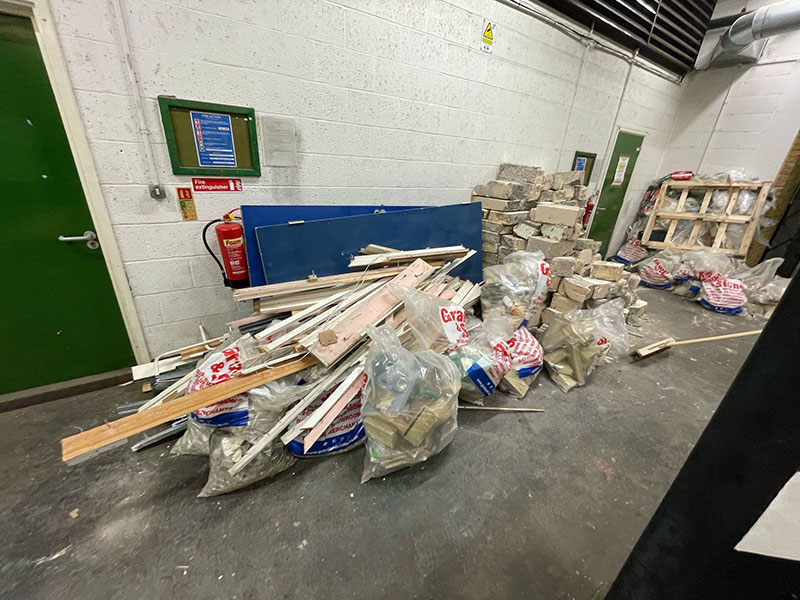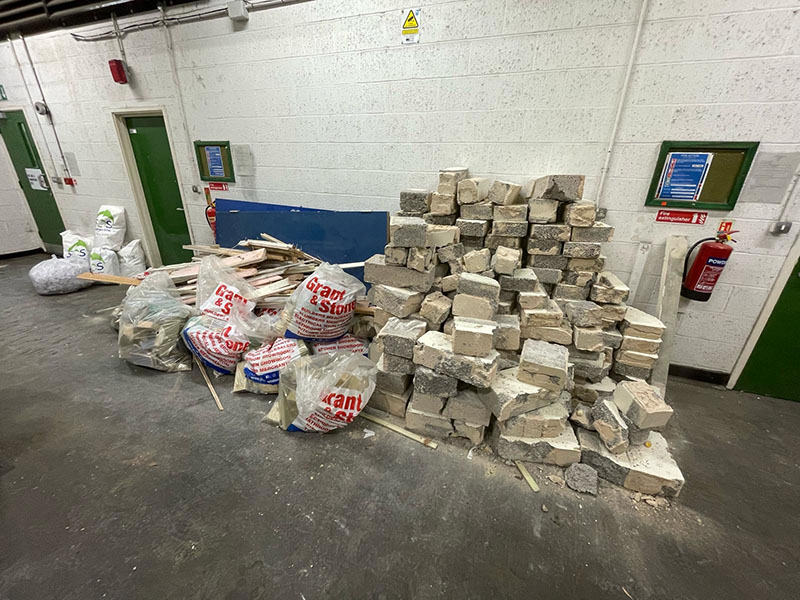DIY & Builder's Waste Removal & Disposal: Comprehensive Guide
 Edited by Ali Lijee
Edited by Ali Lijee
A big part of home remodelling projects and alterations is waste disposal, which is why Rubbish.com should be your first choice for dependable, affordable DIY & builder’s waste removal and disposal. We operate a nationwide network consisting of hundreds of licensed waste carriers operating in towns and cities across the United Kingdom.
We load, remove and dispose of DIY & builder's waste
Table of contents:
- Best DIY & builder's waste removal & disposal service UK
- DIY & builder’s waste removal service near you
- Gallery of DIY & builder's waste we have removed and disposed of
- DIY & builder’s waste removal & disposal: questions people commonly ask
Best DIY & builder's waste removal & disposal service UK
Don’t be left on your own like a rolling stone trying to figure out how to get rid of rubble and other construction & demolition waste from your property and find a hardworking rubbish removal company near you.
Our upper-tier licensed waste carriers can haul a wide range of DIY & builder’s waste, such as concrete, bricks, tiles, ceramics, timber, glass, plastic, bituminous mixtures, aggregates, soil, stones, rubble, waste packaging, offcuts, unused building materials, stripped out fixtures and fittings, and much more.
DIY & builder’s waste removal service near you
Whether you’re remodelling your home or business, refitting a kitchen or bathroom, having your roof redone, or for any other application where you’re generating DIY & builder’s waste, leave the heavy lifting of all unwanted waste to our hardworking member partners.
Dispose of unwanted DIY & builder’s waste with the helpful services of the member partners listed on this site.
Gallery of DIY & builder's waste we have removed and disposed of
DIY & builder’s waste removal & disposal: questions people commonly ask
Do builders have to remove waste?
Builders contracted by homeowners or businesses in the UK must dispose of all construction and demolition waste. Waste generated by a contractor must be disposed of by a licensed Upper Tier Waste Carrier.
DIY & builder’s waste generated by a homeowner must be disposed of by the homeowner at the council tip or through a third-party rubbish removal company who must be licensed upper-tier waste carriers.
Can you reuse construction waste?
Construction waste can often be recycled, depending on the material. Metal can be recycled and timber can be repurposed into engineered wood flooring or furniture, for example. Rubble and concrete can be crushed into coarse aggregates.
According to UK government statistics, an estimated 92.6% of the 59.1 million tonnes of construction and demolition waste generated in 2020 was recycled.
What construction waste cannot be recycled?
Construction waste that cannot be recycled includes broken glass, certain types of plastics, paints cans and solvents, and other waste that is classified as hazardous waste.
Waste that cannot be easily recycled from construction and demolition projects and may require additional regulations and licensing include certain types of soil and stones, dredging soil, gypsum, and insulation. Asbestos removal requires particular care and you will need to contact a professional through the Asbestos Removal Contractors Association due to the danger of asbestos.
What is classed as builders waste?
Builder’s waste includes all manner of non-hazardous construction and demolition waste such as bricks and masonry, concrete, soil, wood and timber, plasterboard and gypsum, insulation, fine and coarse aggregates, and more.
How do you dispose of bricks in the UK?
You can dispose of bricks in the UK at a local Household Waste Recycling Centre. Most council tips will allow you to dispose of bricks as DIY & builder’s waste, although some may charge a fee for dumping this waste and some councils have a maximum permissible amount of DIY & builder’s waste.
You can also contact a local man & van rubbish removal company to dispose of bricks and other construction and demolition waste.
Can you put bricks in garden waste bin?
Councils in the UK will not accept bricks in your garden waste bin. The garden waste bin, usually a brown bin or a green wheelie bin, should not be used for disposing of soil, treated timber, rocks, bricks, or other DIY & builder’s waste.
What should I do with old bricks?
Old bricks can be reused or upcycled into various home projects such as building a beautiful brick pathway, a pizza oven or an outdoor barbecue, a cosy garden bench, edging for your garden beds, koi gardens, and much more.
If you want to dispose of old bricks, consider hiring a skip bin, hauling it to your local council tip, or leaving the heavy lifting to an independent licensed waste carrier.
How do I get rid of rubble in my garden?
Unwanted rubble can be disposed of at a local council tip, with a skip bin hire, or through a rubbish clearance company.
To get rid of rubble from your garden, first consider whether or not you can reuse it or upcycle it into other projects, e.g. a paved pathway with ceramics or bricks. You may also be able to give it away for free, although many homeowners may have no interest in rubble.
How do you get rid of stones and rubble?
Stones and rubble cannot be collected with your local council collection, but you can get rid of these types of construction and demolition waste by hiring a skip bin, hauling it to your council tip yourself, or leaving the heavy lifting to a rubbish removal company.
Stones and rubble can be challenging and expensive to dispose of since you may need to hire a grab lorry, which can be expensive. It is often far more convenient and affordable to hire a rubbish removal company to dispose of this type of waste.
Is it OK to bury a concrete slab?
You should generally avoid burying concrete slab in your garden because concrete has high lime content and a high pH which can interfere with the growth of plants as well as affect drainage on your property.
Burying concrete slab typically requires crushing the concrete into a coarse aggregate, placing approximately 40cm of quality topsoil above, and choosing Mediterranean plants that won’t struggle to grow above the concrete.
It is usually much better to dispose of concrete slab by hiring a man & van rubbish removal company.
How do you get debris out of gravel?
To get rid of unwanted debris from your gravel such as soil residue, consider using a pressure washer, leaf blower, or a makeshift sieve to shake and loosen the gravel and to expose unwanted debris.
What is DIY waste?
DIY waste generally includes all manner of construction and demolition waste generated from home and business remodelling projects and alterations. This includes materials such as soil, bricks and masonry, concrete, glass, metal, and plastic, as well as components and fixtures such as radiators, water heaters, bathtubs, and more.
Can I take bricks to my local tip?
Most council tips and recycling centres in the UK will accept bricks as DIY & builder’s waste. Depending on your local council tip, a fee may be charged for DIY & builder’s waste such as bricks, although it may sometimes be free up until a certain amount. Some councils have maximum permissible amounts of bricks and DIY waste that a homeowner can dump.
How do you dispose of out of date plaster?
Out-of-date or unwanted plaster can be disposed of at Household Waste Recycling Centres. Depending on whether or not the plaster is gypsum-based, disposal methods may vary. Interior plaster is generally gypsum-based. Exterior plaster is generally cement-based.
Non-hazardous gypsum-based plaster and plasterboard may be disposed of at various recycling centres but not through council bulky waste collection or in skips.
Hazardous gypsum-based plaster can be disposed of at recycling centres that accept hazardous waste.
Can you put old plaster in a skip?
Some skip hire companies permit customers to place plasterboard and gypsum-based plasters inside of the skip, some explicitly prohibit it. Those that permit customers to dispose of plasterboard generally require that it is the only material disposed of, i.e. it is not mixed with other waste.
The Environment Agency prohibits the mixing of biodegradable waste with gypsum products such as plasterboard.
How do I dispose of old plaster in the UK?
Most recycling centres will accept old plaster as DIY & builder’s waste so long as it is handled and disposed of properly and that the plaster is non-hazardous.
Gypsum-based plasters and plasterboard, commonly used for home interiors, should be disposed of separately from other mixed household waste since exposure can lead to putrefaction and health hazards.
How do you dispose of roofing felt in the UK?
Felt roofing can be disposed of at most local recycling centres in the UK, but it cannot be recycled. Small quantities of roofing felt such as cut-offs are permissible in your household waste bin (typically your black wheelie bin) so long as the bin lid is closed.
Can I put stones in a skip?
Most skip hire companies in the UK permit customers to dispose of unwanted stones and rubble inside of the skip. Stones and other aggregate materials are commonly disposed of with skip bins, at a local council tip as DIY & builder’s waste with a grab lorry or other vehicle capable of safely transporting the waste, or through a professional rubbish removal company.
Do people take rubble for free?
Some people will gladly accept free rubble from your property, although many will have little interest in it. It may be easier to recycle or upcycle your unwanted rubble for a project in your garden or to simply dispose of it.
Our member partners estimate that the typical cost of builder’s waste removal is around £240 per job, although this figure can fluctuate significantly depending on the amount of rubble.
Can you put stones in general waste bin?
Stones, rubble, and soil should not be placed inside of your general waste bin. Most councils do not accept stones in the general waste bin nor do they accept many other types of waste.
DIY & builder’s waste should be disposed of either through hiring a skip, hauling it to your local recycling centre, or using a rubbish removal company.

 GET QUOTES
GET QUOTES
